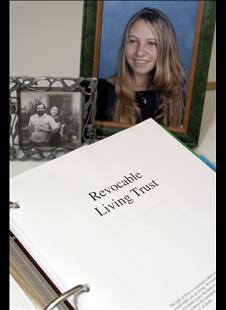|
Monday, June 12, 2017

Many individuals are aware that a will is one way to plan for the distribution of their assets after death. However, a comprehensive estate plan also considers other objectives such as planning for long-term care and asset protection. For this reason, it is essential to consider utilizing an irrevocable trust.
This estate planning tool becomes effective during a person's lifetime, but it cannot be amended or modified. The person making the trust, the grantor, transfers property into the trust permanently. In so doing, the grantor no longer owns property, and a designated trustee owns and manages the assets for the benefit of the beneficiaries.
In short, irrevocable trust provide a number of advantages. First, the property is not subject to estate taxes because the grantor no longer owns it. Moreover, unlike a will, an irrevocable trust is not probated in court. Finally, assets are protected from creditors.
Common Irrevocable Trusts
There are a variety of irrevocable trusts, including:
-
Bypass Trusts - utilized by married couples to reduce estate taxes when the second spouse dies. In this arrangement, the property of the spouse who dies first is transferred into the trust for the benefit of the surviving spouse. Because he or she does not own it, the property does not become part of this spouse's estate when he or she dies.
-
Charitable Trusts - created to reduce income and estate taxes through a combination of gifting and charitable donations. For example, charitable remainder trust transfers property into a trust and names a charity as the final beneficiary, but another individual receives income before, for a certain time period.
-
Life Insurance Trusts - proceeds of life insurance are removed from the estate and ownership of the policy is transferred into the trust. While insurance passes outside of the estate, it is factored into the value of the estate for tax purposes, so this vehicle is designed to minimize estate taxes.
-
Special needs trusts - designed to protect the public benefits that many special needs individuals receive. Since an inheritance could disqualify a beneficiary from Medicaid, for example, this estate planning tool provides money for additional day to day expenses while preserving the government benefits.
The Takeaway
Irrevocable trusts are essential estate planning tools that can protect an individual's assets, minimize taxes and provide for loved ones. In the end, these objectives can be accomplished with the advice and counsel of an experienced estate planning attorney.
Monday, November 14, 2016

There are many benefits to a revocable living trust that are not available in a will. An individual can choose to have one or both, and an attorney can best clarify the advantages of each. If the person engaged in planning his or her estate wants to retain the ability to change or rescind the document, the living trust is probably the best option since it is revocable.
The document is called a “living” trust because it is applicable throughout one's lifetime. Another individual or entity, such as a bank, can be appointed as trustee to manage and protect assets and to distribute assets to beneficiaries upon one's death.
Read more . . .
Monday, November 30, 2015
3137.jpg)
A Pooled Income Trust is a special type of trust that allows individuals of any age (typically over 65) to become financially eligible for public assistance benefits (such as Medicaid home care and Supplemental Security Income), while preserving their monthly income in trust for living expenses and supplemental needs. All income received by the beneficiary must be deposited into the Pooled Income Trust which is set up and managed by a not-for-profit organization.
In order to be eligible to deposit your income into a Pooled Income Trust, you must be disabled as defined by law. For purposes of the Trust, "disabled" typically includes age-related infirmities. The Trust may only be established by a parent, a grandparent, a legal guardian, the individual beneficiary (you), or by a court order.
Typical individuals who use a Pool Income Trust are: (a) elderly persons living at home who would like to protect their income while accessing Medicaid home care; (2) recipients of public benefit programs such as Supplemental Security Income (SSI) and Medicaid; (3) persons living in an Assisted Living Community under a Medicaid program who would like to protect their income while receiving Medicaid coverage.
Medicaid recipients who deposit their income into a Pool Income Trust will not be subject to the rules that normally apply to "excess income," meaning that the Trust income will not be considered as available income to be spent down each month. Supplemental payments for the benefit of the Medicaid recipient include: living expenses, including food and clothing; homeowner expenses including real estate taxes, utilities and insurance, rental expenses, supplemental home care services, geriatric care services, entertainment and travel expenses, medical procedures not provided through government assistance, attorney and guardian fees, and any other expense not provided by government assistance programs.
As with all long term care planning tools, it’s imperative that you consult a qualified estate planning attorney who can make sure that you are in compliance with all local and federal laws.
Monday, September 14, 2015
 How can I control my assets after death? How can I control my assets after death?
The practice of estate planning is dedicated to preserving an individual’s control over his or her assets after death. A simple will can control which individuals receive what assets, but a more thorough plan has the potential to do much more. Establishing a trust is the most common method used to exercise this kind of control.
A trust can issue a bequest restricted by a condition; for example, a trust might be established to pay out $10,000.00 to a specific grandchild only once he or she has reached 18 years of age. Multiple payments can be made to the beneficiaries as long as the trust is funded. The trust can stipulate that the grandchild may have to graduate from college to receive the money, or even that he or she must graduate from a specific school with a minimum grade-point average or membership in a particular fraternity or sorority.
A trust can make the condition of payment as specific or as broad as the creator of the trust wishes. It may, for instance, bequeath benefits to a humanitarian organization on condition that the organization continues to provide food and shelter to the homeless. There is no limit to the number of conditions permissible in a trust document. Even when the conditions go against public policy and general norms and mores established by society, as long as the conditions may be met legally, they will be upheld by the court.
In order to create a trust, there must be a capital investment to fund it and a trustee must be named. The trustee is responsible for protecting the assets of the trust, investing them to the best of his or her ability, managing real estate and other long-term assets, interpreting the trust document, communicating regularly with the beneficiaries of the trust and performing all of these actions with a high level of integrity. Trust assets may be used to pay for expenses of managing the trust as well as to provide a stipend for the trustee if so provided for in the trust document.
If a trust document is not well written, it may be the target of a lawsuit seeking to dissolve the trust and disburse the assets held therein. Even if the trust is defended successfully, the costs of this challenge may deplete its coffers and frustrate the very reason for its creation. In order to avoid these possible pitfalls, it is imperative that a trust document be drafted by an attorney with a high degree of experience in estate planning law.
Saturday, August 30, 2014
6696.jpg)
Properly drafted estate planning documents are integral to the success of your legacy and end-of-life wishes. Iron-clad estate planning documents, written by a knowledgeable attorney can make the difference between the success and failure of having your wishes carried out. However, there’s more to estate planning than paperwork. For your wishes to have the best chance of being honored, it is important to carefully choose the people who will carry them out.
Your estate plan can assign different responsibilities to different people. The person who you most trust to raise your children, for example, may not be the person you’d designate to make health care decisions on your behalf, if you are incapacitated. Before naming individuals to carry out your various estate and incapacity planning wishes, you should carefully consider the requirements of each role and the attributes which each individual has that will allow him or her to perform the duties effectively.
Executor. You name the executor, (also known as a personal representative), in your will. This person is responsible for carrying out all the terms of your will and guiding your will through probate, if necessary. The executor usually works closely with a probate or estate administration attorney, especially in situations where will contests arise and your estate becomes involved in litigation. You may appoint co-executors, or name a professional – such as a lawyer or accountant – as the co-executor.
Health care proxy. Your health care proxy is the person you name to make medical decisions for you in the event you are incapacitated and unable to do so yourself. In addition to naming a health care proxy (sometimes called a health care power of attorney), most people also create a living will (or health care directive), in which they directly state their wishes for medical care and end-of-life care in the event of incapacity. When choosing a health care proxy, select a person who you know understands your wishes regarding medical care, and who you trust to carry out those wishes, even if other family members disagree. You should also consider individuals who have close geographic proximity to you as well as persons you believe can make difficult decisions under pressure.
Power of attorney. A financial power of attorney (or simply power of attorney) is different from a health care power of attorney in that it gives another person the authority to act on your behalf in financial matters including banking, investments and taxes. You can limit the areas in which the person may act, or you may grant unlimited authority. A power of attorney may also be limited for a specific time, or it may be a durable power of attorney, in which case it will continue even after the onset of incapacity (until your death). A power of attorney can take effect immediately or “spring” into effect in the event of incapacity.
Guardians. If you have minor children or other dependents (disabled adult children or other disabled adults for whom you are the named guardian), then your estate plan should name a person or persons to take over the parental role in the event of your death. The guardian may also have control over any assets that you leave directly to your minor children or other dependents. If you create a trust for the benefit of your minor children, then the trust’s trustee(s) will have control over those assets and their distribution. Important considerations include age of the guardian, compatibility with his or her personality and moral values as well as the extent and quality of the existing relationship with your children.
Trustee. If you place any assets in trust as part of your estate plan, then you must designate one or more trustees, who will act as the legal owners of the trust. If you do not wish to appoint someone you know personally, you may appoint a corporate trustee – often a bank – to play this role. Corporate trustees are often an excellent choice, since they are financial professionals and neutral, objective third parties. Its important you select individuals who are not only trustworthy but also organized, diligent and detail oriented.
Friday, August 22, 2014
8999.jpg)
Transfer of property at death can be rather complex. Many are under the impression that instructions provided in a valid will are sufficient to transfer their assets to the individuals named in the will. However, there are a myriad of rules that affect how different types of assets transfer to heirs and beneficiaries, often in direct contradiction of what may be clearly stated in one’s will.
The legal process of administering property owned by someone who has passed away with a will is called probate. Prior to his passing, a deceased person, or decedent, usually names an executor to oversee the process by which his wishes, outlined in his Will, are to be carried out. Probate property, generally consists of everything in a decedent’s estate that was directly in his name. For example, a house, vehicle, monies, stocks or any other asset in the decedent’s name is probate property. Any real or personal property that was in the decedent’s name can be defined as probate property.
The difference between non-probate property and probate centers around whose name is listed as owner. Non-probate property consists of property that lists both the decedent and another as the joint owner (with right of survivorship) or where someone else has already been designated as a beneficiary, such as life insurance or a retirement account. In these cases, the joint owners and designated beneficiaries supersede conflicting instructions in one’s will. Other examples of non-probate property include property owned by trusts, which also have beneficiaries designated. At the decedent’s passing, the non-probate items pass automatically to whoever is the joint owner or designated beneficiary.
Why do you need to know the difference? Simply put, the categories of probate and non-probate property will have a serious effect on how plan your estate. If you own property jointly with right of survivorship with another individual, that individual will inherit your share, regardless of what it states in your will. Estate and probate law can be different from state-to-state, so it’s best to have an attorney handle your estate plan and property ownership records to ensure that your assets go to the intended beneficiaries.
Sunday, August 10, 2014

A Pooled Income Trust is a special kind of trust that is established by a non-profit organization. This trust allows individuals of any age (typically over 65) to become financially eligible for public assistance benefits (such as Medicaid home care and Supplemental Security Income), while preserving their monthly income in trust for living expenses and supplemental needs. All income received by the beneficiary must be deposited into the Pooled Income Trust.
In order to be eligible to deposit your income into a Pooled Income Trust, you must be disabled as defined by law. For purposes of the Trust, "disabled" typically includes age-related infirmities. The Trust may only be established by a parent, a grandparent, a legal guardian, the individual beneficiary (you), or by a court order.
Typical individuals who use a Pool Income Trust are: (1) elderly persons living at home who would like to protect their income while accessing Medicaid home care; (2) recipients of public benefit programs such as Supplemental Security Income (SSI) and Medicaid; (3) persons living in an Assisted Living Community under a Medicaid program who would like to protect their income while receiving Medicaid coverage.
Medicaid recipients who deposit their income into a Pooled Income Trust will not be subject to the rules that normally apply to "excess income," meaning that the Trust income will not be considered as available income to be spent down each month. Supplemental payments for the benefit of the Medicaid recipient include: living expenses, including food and clothing; homeowner expenses including real estate taxes, utilities and insurance, rental expenses, supplemental home care services, geriatric care services, entertainment and travel expenses, medical procedures not provided through government assistance, attorney and guardian fees, and any other expense not provided by government assistance programs.
Wednesday, July 30, 2014

If you’ve been named a beneficiary in a loved one’s estate plan, you’ve likely wondered how long it will take to receive your share of the inheritance after his or her passing. Unfortunately, there’s no hard or and fast rule that allows an estate planning attorney to answer this question. The length of time it takes to distribute assets in an estate can vary widely depending upon the particular situation.
Some of the factors that will be involved in determining how long it takes to fully administer an estate include whether the estate must be probated with the court, whether assets are difficult to value, whether the decedent had an ownership interest in real estate located in a state other than the state they resided in, whether your state has a state estate (or inheritance) tax, whether the estate must file a federal estate tax return, whether there are a number of creditors that must be dealt with, and of course, whether there are any disputes about the will or trust and if there may be disagreements among the beneficiaries about how things are being handled by the executor or trustee.
Before the distribution of assets to beneficiaries, the executor and trustee must also make certain to identify any creditors because they have an obligation to pay any legally enforceable debts of the decedent with those assets. If there must be a court filed probate action there may be certain waiting periods, or creditor periods, prescribed by state law that may delay things as well and which are out of the control of the executor of the estate.
In some cases, the executor or trustee may make a partial distribution to the beneficiaries during the pending administration but still hold back sufficient assets to cover any income or estate taxes and other administrative fees. That way the beneficiaries can get some benefit but the executor is assured there are assets still in his or her control to pay those final taxes and expenses. Then, once those are fully paid, a final distribution can be made. It is not unusual for the entire process to take 9 months to 18 months (sometime more) to fully complete.
If you’ve been named a beneficiary and are dealing with a trustee or executor who is not properly handling the estate and you have yet to receive your inheritance, you should contact a qualified estate planning attorney for knowledgeable legal counsel.
Wednesday, July 16, 2014
6948.jpg)
If a person becomes mentally or physically handicapped to a point where they can no longer make rational decisions about their person or their finances, their loved ones may consider a guardianship or a conservatorship whereby a guardian would make decisions concerning the physical person of the disabled individual, and conservators make decisions about the finances.
Typically, a loved one who is seeking a guardianship or a conservatorship will petition the appropriate court to be appointed guardian and/or conservator. The court will most likely require a medical doctor to make an examination of the disabled individual, also referred to as the ward, and appoint an attorney to represent the ward’s interests. The court will then typically hold a hearing to determine whether a guardianship and/or conservatorship should be established. If so, the ward would no longer have the ability to make his or her own medical or financial decisions. The guardian and/or conservator usually must file annual reports on the status of the ward and his finances.
Guardianships and conservatorships can be an expensive legal process, and in many cases they are not necessary or could be avoided with a little advance planning. One way is with a financial power of attorney, and advance directives for healthcare such as living wills and durable powers of attorney for healthcare. With those documents, a mentally competent adult can appoint one or more individuals to handle his or her finances and healthcare decisions in the event that he or she can no longer take care of those things. A living trust is also a good way to allow someone to handle your financial affairs – you can create the trust while you are alive, and if you become incompetent someone else can manage your property on your behalf.
In addition to establishing durable powers of attorney and advanced healthcare directives, it is often beneficial to apply for representative payee status for government benefits. If a person gets VA benefits, Social Security or Supplemental Security Income, the Social Security Administration or the Veterans’ Administration can appoint a representative payee for the benefits without requiring a conservatorship. This can be especially helpful in situations in which the ward owns no assets and the only income is from Social Security or the VA.
When a loved one becomes mentally or physically handicapped to the point of no longer being able to take care of his or her own affairs, it can be tough for loved ones to know what to do. Fortunately, the law provides many options for people in this situation.
Thursday, July 10, 2014

During the estate planning process, your attorney will draft a number of legal documents such as a will, trust and power of attorney which will help you accomplish your goals. While these legal documents are required for effective planning, they may not sufficiently convey your thoughts and wishes to your loved ones in your own words. A letter of instruction is a great compliment to your “formal” estate plan, allowing you to outline your wishes with your own voice.
This letter of instruction is typically written by you, not your attorney. Some attorneys may, however, provide you with forms or other documents that can be helpful in composing your letter of instruction. Whether your call this a "letter of instruction" or something else, such a document is a non-binding document that will be helpful to your family or other loved ones.
There is no set format as to what to include in this document, though there are a number of common themes.
First, you may wish to explain, in your own words, the reasoning for your personal preferences for medical care especially near the end of life. For example, you might explain why you prefer to pass on at home, if that is possible. Although this could be included in a medical power of attorney, learning about these wishes in a personalized letter as opposed to a sterile legal document may give your loved ones greater peace of mind that they are doing the right thing when they are charged with making decisions on your behalf. You might also detail your preferences regarding a funeral, burial or cremation. These letters often include a list of friends to contact upon your death and may even have an outline of your own obituary.
You may also want to make note of the following in your letter to your loved ones:
- an updated list of your financial accounts with account numbers;
- a list of online accounts with passwords;
- a list of important legal documents and where to find them;
- a list of your life insurance and where the actual policies are located;
- where you have any safe deposit boxes and the location of any keys;
- where all car titles are located; the
- names of your CPA, attorney, banker, insurance advisor and financial advisor;
- your birth certificate, marriage license and military discharge papers;
- your social security number and card;
- any divorce papers; copies of real estate deeds and mortgages;
- names, addresses, and phone numbers of all children, grandchildren, or other named beneficiaries.
In drafting your letter, you simply need to think about what information might be important to those that would be in charge of your affairs upon your death. This document should be consistent with your legal documents and updated from time to time.
Friday, June 20, 2014

If you are about to begin the estate planning process, you have likely heard the term "funding the trust" thrown around a great deal. What does this mean? And what will happen if you fail to fund the trust?
The phrase, or term, "funding the trust" refers to the process of titling your assets into your revocable living trust. A revocable living trust is a common estate planning document and one which you may choose to incorporate into your own estate planning. Sometimes such a trust may be referred to as a "will substitute" because the dispositive terms of your estate plan will be contained within the trust instead of the will. A revocable living trust will allow you to have your affairs bypass the probate court upon your death, using a revocable living trust will help accomplish that goal.
Upon your death, only assets titled in your name alone will have to pass through the court probate process. Therefore, if you create a trust, and if you take the steps to title all of your assets in the name of the trust, there would be no need for a court probate because no assets would remain in your name. This step is generally referred to as "funding the trust" and is often overlooked. Many people create the trust but yet they fail to take the step of re-titling assets in the trust name. If you do not title your trust assets into the name of the trust, then your estate will still require a court probate.
A proper trust-based estate plan would still include a will that is sometimes referred to as a "pour-over" will. The will acts as a backstop to the trust so that any asset that is in your name upon your death (instead of the trust) will still get into the trust. The will names the trust as the beneficiary. It is not as efficient to do this because your estate will still require a probate, but all assets will then flow into the trust.
Another option: You can also name your trust as beneficiary of life insurance and retirement assets. However, retirement assets are special in that there is an "income" tax issue. Be sure to seek competent tax and legal advice before deciding who to name as beneficiary on those retirement assets.
StoneLAW, PLLC is a boutique law firm that assists clients in Minneapolis, Saint Paul and throughtout the Twin Cities region including Osseo, Hamel, Wayzala, Long Lake, Hopkins and Loretto in Hennepin County, Wright County and Ramsey County.
|

|
|
|